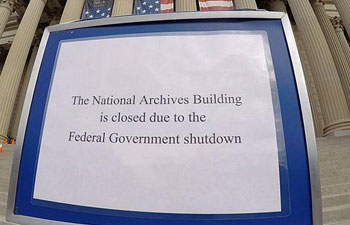WASHINGTON, Jan. 22 (Xinhua) -- The Pennsylvania Supreme Court ruled on Monday the state's congressional map as unconstitutionally gerrymandered, a move that would potentially boost Democratic chances of flipping the U.S. House of Representatives later this year.
The court, where Democrats have a 5-2 majority, blocked the use of the map in 2018 midterm elections and ordered Republican-controlled Legislature to pass a replacement.
If state lawmakers do not submit new lines by Feb. 9, or if Democratic Governor Tom Wolf fails to sign off by Feb. 15, the court said it would adopt its own plan to keep the May 15 primary election on track.
The deadline to apply for running in primaries for the state's congressional seats is March 6.
The Monday ruling said that the boundaries "clearly, plainly and palpably violates the Constitution of the Commonwealth of Pennsylvania, and on that sole basis, we hereby strike it as unconstitutional."
The defendants -- top Republican lawmakers -- said that the decision lacks clarity and respect for the constitution and that they would ask the U.S. Supreme Court to step in.
But the high court is unlikely to intervene as the Pennsylvania case deals with state law, not federal.p Following the 2010 census, Republicans who controlled the Legislature and governor's office redrew the map in 2011 by shifting whole counties and cities into different districts to protect their advantage in congressional delegation.
They secured 13 of 18 seats Pennsylvania where registered Democratic voters outnumbered their Republican counterparts 5 to 4.
The immediate implication for the decision would be that 14 sitting members of Congress and dozens more people are running or considering doing so in districts they may no longer live in.
Pennsylvania is a swing state that has backed candidate at different levels from both parties in the last two election cycles.
Experts said that a nonpartisan district map could flip as many as three of those seats to the Democrats, a result that would potentially boost Democrats' chances to win the House majority in the November midterm elections.
Democrats need only 24 seats to take control of the House.
Others said that the Pennsylvania case could encourage similar state-court challenges elsewhere.
The Supreme Court is already weighing whether to set a legal standard for partisan gerrymandering in two cases from states of Maryland and Wisconsin.
The high court, which has never struck down an electoral map as a partisan gerrymander, is expected to rule by the end of June in both cases.

















